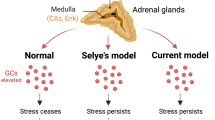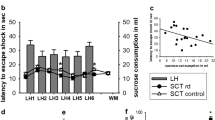Abstract
The hippocampus is often considered to be an important site for stress and learning interactions; however, it has never been demonstrated whether these effects require the hippocampus. In the current study, hippocampal lesions prevented both enhancements of learning after stress in male rats and impairments of learning after stress in female rats without disrupting learning itself in either sex. Thus, the hippocampus is necessary for modifying learning in males and females after acute stressful experience.
This is a preview of subscription content, access via your institution
Access options
Subscribe to this journal
Receive 12 print issues and online access
$209.00 per year
only $17.42 per issue
Buy this article
- Purchase on Springer Link
- Instant access to full article PDF
Prices may be subject to local taxes which are calculated during checkout


Similar content being viewed by others
References
McEwen, B.S. & Sapolsky, R.M. Curr. Opin. Neurobiol. 5, 205–216 (1995).
Weiss, C., Sametsky, E., Sasse, A., Spiess, J. & Disterhoft, J.F. Learn. Mem. 12, 138–143 (2005).
Roozendaal, B., Griffith, Q.K., Buranday, J., de Quervain, D.J. & McGaugh, J.L. Proc. Natl. Acad. Sci. USA 100, 1328–1333 (2003).
Solomon, P.R., Vander Schaaf, E.R., Thompson, R.F. & Weisz, D.J. Behav. Neurosci. 100, 729–744 (1986).
Shors, T.J., Weiss, C. & Thompson, R.F. Science 257, 537–539 (1992).
Wood, G.E. & Shors, T.J. Proc. Natl. Acad. Sci. USA 95, 4066–4071 (1998).
Sapolsky, R.M., Krey, L.C. & McEwen, B.S. Proc. Natl. Acad. Sci. USA 81, 6174–6177 (1984).
Tuvnes, F.A., Steffenach, H.A., Murison, R., Moser, M.B. & Moser, E.I. J. Neurosci. 23, 4345–4354 (2003).
Beylin, A.V. & Shors, T.J. Horm. Behav. 43, 124–131 (2003).
Shors, T.J. Neurobiol. Learn. Mem. 75, 10–29 (2001).
Leuner, B., Mendolia-Loffredo, S. & Shors, T.J. Biol. Psychiatry 56, 964–970 (2004).
Shors, T.J., Chua, C. & Falduto, J. J. Neurosci. 21, 6292–6297 (2001).
Shors, T.J. & Mathew, P.R. Learn. Mem. 5, 220–230 (1998).
Bangasser, D.A., Santollo, J. & Shors, T.J. Behav. Neurosci. 119, 1459–1466 (2005).
Paxinos, G. & Watson, C. The Rat Brain in Stereotaxic Coordinates 3rd edn. (Academic Press, Orlando, Florida, USA, 1997).
Acknowledgements
Special thanks to D.E. Waxler for comments on the manuscript and to D. Vargas and A. Tang for technical support. This work was supported by US National Institute of Mental Health (59970) and National Science Foundation (IOB-0444364) grants to T.J.S. and a National Institute of Mental Health (AG19957-06) grant to D.A.B.
Author information
Authors and Affiliations
Corresponding author
Supplementary information
Supplementary Text and Figures
Supplementary Methods and Results (PDF 104 kb)
Rights and permissions
About this article
Cite this article
Bangasser, D., Shors, T. The hippocampus is necessary for enhancements and impairments of learning following stress. Nat Neurosci 10, 1401–1403 (2007). https://doi.org/10.1038/nn1973
Received:
Accepted:
Published:
Issue Date:
DOI: https://doi.org/10.1038/nn1973
This article is cited by
-
Even affective changes induced by the global health crisis are insufficient to perturb the hyper-stability of visual long-term memory
Cognitive Research: Principles and Implications (2022)
-
The estrous cycle modulates early-life adversity effects on mouse avoidance behavior through progesterone signaling
Nature Communications (2022)
-
Androgens and the developing hippocampus
Biology of Sex Differences (2020)
-
Paeoniflorin attenuates impairment of spatial learning and hippocampal long-term potentiation in mice subjected to chronic unpredictable mild stress
Psychopharmacology (2019)
-
MAP training: combining meditation and aerobic exercise reduces depression and rumination while enhancing synchronized brain activity
Translational Psychiatry (2016)



